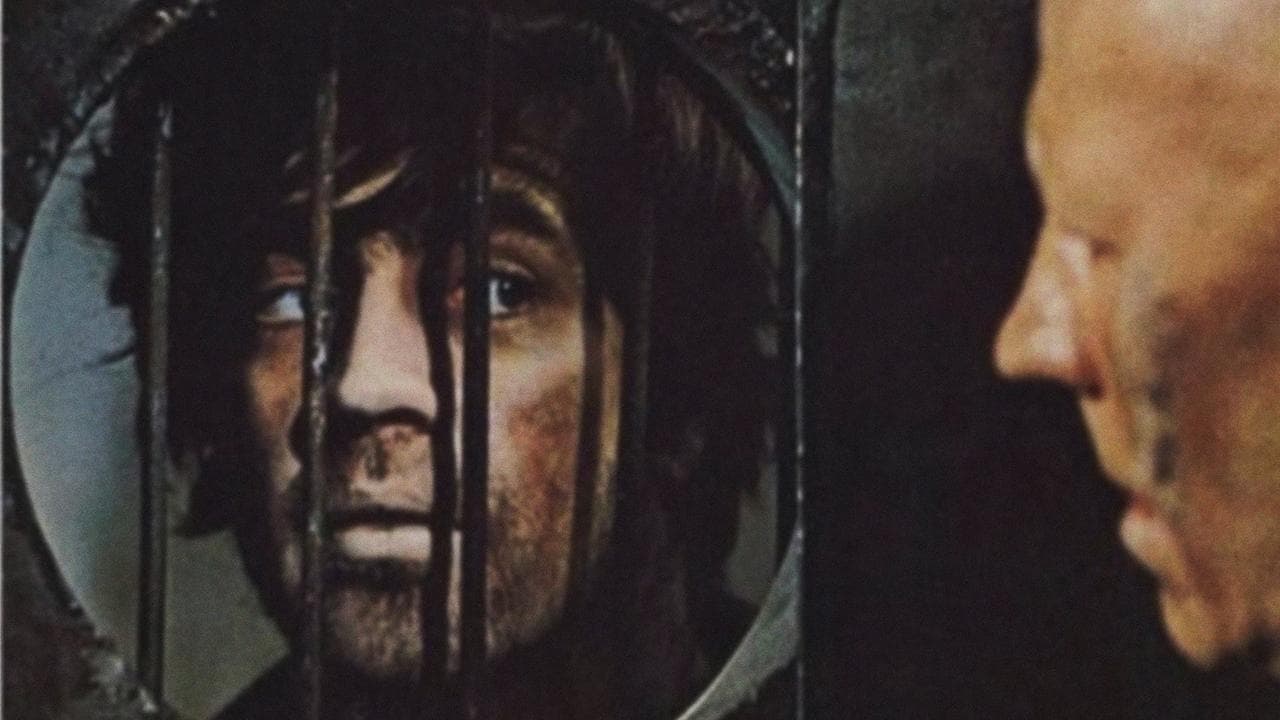JasparLamarCrabb
John Frankenheimer's sometimes overwrought but mostly powerful version of Bernard Malamud's novel stars Alan Bates as a Jewish handyman in Tsarist Russia who faces myriad charges when he attempts to pass himself off as a Christian. Not always easy to sit through, the film throws horror after horror at Bates, who goes from sneaky to self-righteous to insane to martyr. Bates gives a towering performance and the strong supporting cast includes Dirk Borgarde as his (oddly debonair) lawyer, Georgia Brown as the sleazy mother of a murdered boy and Hugh Griffith as a drunken anti-Semite. Elizabeth Hartman is strangely cast as Giffith's amorous daughter. David Warner and Ian Holm are in it too and there's a very outré cameo by Murray Melvin as a priest (hoping to convert the very uninterested Bates). Frankenheimer and scriptwriter Dalton Trumbo do a very good job recreating a really horrible time in Russian history and the Hungarian countryside makes a good substitute as a decidedly cold Kiev. There's stunning cinematography by Marcel Grignon. The chilling music score by Maurice Jarre is marred by some really shrieking violin solos.
James Hitchcock
The "fixer" of the title is Yakov Bok, a Jewish handyman living in the Ukrainian city of Kiev. The film is set in the early twentieth century when that city still formed part of the Russian Empire. This was the period of the anti-Semitic persecutions known as pogroms, one of which is vividly depicted in the opening scenes.Bok's life is changed when he saves the life of a wealthy gentile. This man wants to reward Bok for this deed, but Bok, knowing him to be a virulent anti-Semite, claims the reward under a false name, implying that he is a gentile himself. The man uses his influence to put lucrative work Bok's way, but Bok is then wrongly accused of rape by his patron's daughter Zinaida. Upon examination the charge is found to be false, but the investigations have revealed Bok's Jewish background and brought him to the attention of the authorities. He is arrested again, this time on trumped-up charges of murdering a Christian boy in an example of an anti-Semitic "blood libel".The plot has similarities with those of earlier films set in the American Deep South such as "Intruder in the Dust" and "To Kill a Mockingbird". At a time of racial tensions, a member of a racial minority is accused of a serious crime against a member of the majority community. The accused man is defended by a liberal lawyer who tries desperately to ensure that his client receives a fair trial, but this proves impossible given the prevailing atmosphere of prejudice. This plot was later used as the basis of David Guterson's novel "Snow Falling on Cedars" and of its film adaptation, which dealt with anti-Japanese feeling in the Pacific North-West following the attack on Pearl Harbor. The liberal lawyer in "The Fixer" is Bibikov, the examining magistrate who investigated the alleged rape of Zinaida and who realises that Bok has become the victim of a plot by the authorities. Bibikov's efforts succeed in making the case an international cause celebre; the authorities respond by torturing Bok in an attempt to get him to confess.Surprisingly, this film brought Alan Bates, who plays Bok, his only Oscar nomination. I say "surprisingly" because, although Bates is good here, the film as a whole is inferior to several others in which he gave performances that were as good or better, such as "Whistle Down the Wind", "Far from the Madding Crowd" and "The Go-Between". Perhaps the reason is that "The Fixer" is one of his relatively few American films; most of his best films were made in Britain, and hence tended to be overlooked by the Academy.Bok is a rationalist who has no interest in practising Judaism or any other religion, yet he is hated by the anti-Semites as much as any religiously observant Jew. (There are, however, limits to Bok's secularism. Zinaida's false accusation comes after she has failed to seduce him because he will not breach the Jewish religious taboo against having sex with a menstruating woman). This raises some interesting questions about Jewish identity. "What does it mean to be a 'secular Jew'", and "How is Jewishness defined?".The controversial suggestion is made in the film that a Jewish racial identity (as opposed to a Jewish religious identity) may be a definition forced onto people from outside, a creation of the anti-Semites themselves. The film also (and equally controversially) suggests that ant-Semitism may itself be an artificial creation, something deliberately fomented by the powers that be in order to focus popular discontent on something other than the powers that be themselves. This was at one time a widely-held view on the Left (versions of it can be found in Brecht's "Die Rundeköpfe und die Spitzköpfe" and Chaplin's "The Great Dictator") but it has become less prevalent since 1945. The ferocity of the Nazi persecution of the Jews suggests that anti-Semitism is not only more prevalent in European society but also a more complex problem than was once thought.The film was directed by John Frankenheimer who in the sixties was noted for directing films with a liberal political slant, mostly starring Burt Lancaster, such as "The Birdman of Alcatraz". The screenplay was written by Dalton Trumbo, who was known for his Communist sympathies. The film, however, is not as overtly left-wing as one might expect from that particular combination. It certainly savages Tsarism, but in the sixties few Americans really worried themselves about the pros and cons of a regime that had been overthrown some fifty years earlier. For the most part it contents itself with preaching not a specifically leftist message but a sermon about man's inhumanity to man.Now there have been many good films made on that subject, and a few great ones. (Trumbo even wrote the script for one of the great ones, Kubrick's "Spartacus"). "The Fixer", however, is certainly not a great film, and in my opinion not even a very good one. The first part is certainly interesting, and Bates receives good support from another British actor, Dirk Bogarde, as Bibikov. The film, however, is overlong, and the latter part is disappointing, especially after Bibikov is found mysteriously hanged. (One presumes he has been murdered by the authorities to silence him, but this is never made explicit). Towards the end it slides into mysticism, with Bok being visited in his cell by a vision of the Tsar himself. Trumbo seems to lose interest in Bok as an individual, presenting him as a generalised symbol of humanity, even (despite his atheism) as a Christ-figure. What began as an interesting film ends as a preachy, sententious one, worthy but wordy. 5/10
Lee Eisenberg
When people think of anti-Semitism, they usually think of Hitler's Third Reich. But equally as bad was czarist Russia. In "The Fixer", Yakov Bok (Alan Bates) is a Jewish man who leaves the Pale (the area in Eastern Europe to which Jews were relegated) to work for someone. When they discover that he is a Jew, they imprison him on a trumped-up charge. Specifically, government bureaucrat Grubeshov (Ian Holm) believes that Jews are downright untrustworthy.The movie also shows how Yakov has to hide his background once he leaves the ghetto. In one scene, he is about to have sex with aristocrat Zinaida (Elizabeth Hartman), but he realizes that she will see that he is circumcised, and so he leaves.We can clearly see how anti-Semitic feelings were alive and well long before Hitler came to power. It's always important to remember these kinds of things.
kucheeku
When is John Frankenheimer going to get the recognition he deserves as a true original film artist? A number of his films are either barely released or completely unreleased (99 and 44/100% Dead, The Challenge, The Fourth War). Many of Frankenheimer's films dealt with the fight for social justice and human compassion and The Fixer definitely falls into this category. Alan Bates is terrific as a Russian Jew who "passes" for Gentile and decides to work for an anti-Semite for money. He's later accused by the authorities of a child murder he did not commit and must endure endless torture by the Czarist Russians to keep from confessing. Frankenheimer's experience, directing many plays for Golden Age of Television shows like Playhouse 90, demonstrates perfectly that he can master effective facial close-ups and enhance the great dialogue. So few American films can be brave enough to actually talk about ideas without having to always resort to action to appease those out there with short attention spans. Well, Frankenheimer can deliver the action goods (note Ronin and The Train), but give him credit for embracing the influence of great foreign films' sense of introspection. The claustrophobic atmosphere of the prison is so immense that the final scene is one of the most exhilarating I've felt in quite a while. Credit Trumbo also with creating a hero who is not totally perfect by any means. Yakov Bok had not only betrayed his heritage by working for anti-Semites, but also, as we learn later, is out of touch with relating to his family. Dirk Bogarde is also quite good as Bok's defense counsel as is a young Ian Holm as a sadistic Russian official.


 AD
AD


